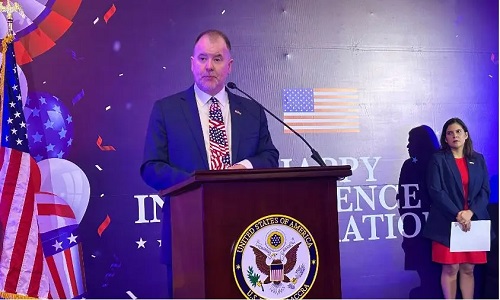Ghanaians holding valid US visas can continue to travel under their existing terms despite recent changes to the visa validity schedule, the United States Embassy in Ghana has confirmed in an exclusive interview with GraphicOnline.
Speaking in an exclusive interview with the GraphicOnline on Wednesday, July 9, 2025, the Chargé d’Affaires at the US Embassy in Accra, Mr Rolf Olson, assured the Ghanaian public that the recent policy change, which reduced the validity of B-1 and B-2 visitor visas from five years to three months, applies only to new visa issuances.
![]()
“Anybody who already has a visa, there’s no change to the status of that visa,” Mr Olson stated. “If you have five years multiple entry or three years multiple entry—whatever the status—the current visa does not change. This is only about new issuances going forward.”
Related Articles
Ghana expresses concern over US visa policy changes; pledges diplomatic engagement
US cuts visa validity for applicants from three African countries
New U.S. Visa Rules: Most Ghanaians now limited to single-entry, 3-month visas
Ghana risks US visa ban over high student overstay rate – Foreign Minister warns
The clarification comes amid public concern following the US State Department’s announcement that tourist and business visas issued to Ghanaians would now be valid for only three months and for single entry. The move is part of a broader global immigration adjustment aimed at strengthening fraud detection and prevention.
“The visa validity schedule was changed for a number of other countries all around the world because we believe that it is easier for us to detect and prevent fraud when we have shorter visa validities,” Mr Olson explained.
He reiterated that the new policy does not reflect any punitive action against Ghana, nor does it alter eligibility criteria for visa applicants. “What has been changed is what’s called the reciprocity schedule,” he noted, “and it shows the maximum validity of a visa that can be issued for a particular category.”
The US diplomat also addressed common misconceptions about the revised visa term, clarifying that the three-month limit refers only to the window within which the holder must enter the United States; not the duration of stay. “It’s not about how long you have to stay in the United States, and that’s a common misperception,” he said.
On arrival, the length of stay for travellers is still determined by US Customs and Border Protection (CBP) officers at the port of entry. While B-1 and B-2 visa holders are typically granted a six-month stay, CBP officers reserve the right to shorten or extend that duration based on the traveller’s circumstances.
Mr Olson added that F-1 student visa holders will continue to be granted stay periods based on the full duration of their academic programmes.
He also addressed concerns over visa overstays, particularly among Ghanaian students. The US government, he said, had noted a 21 per cent overstay rate, above its 15 per cent benchmark, and would continue engaging with Ghanaian authorities to resolve the issue.
“Every visa adjudication is a national security decision,” Mr Olson stated, adding that the changes align with the US President’s immigration policy priorities.
The Embassy urged Ghanaians to familiarise themselves with the updated requirements and reassured the public of continued cooperation between Ghana and the United States in immigration and border security matters.

